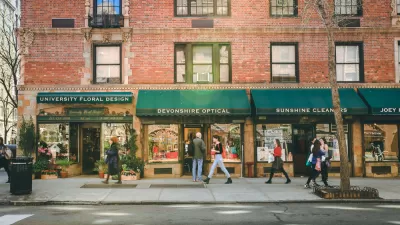A look at how to program social equity into the planning process, and balance NIMBY concerns with collective goals, by Howard Blackson, leader of AVRP SkyPort Studios Urban Design practice in San Diego.
NIMBYISM, i.e., self-interest and the fear of change, is obstructing the development of affordable housing, transit, and more livable communities. However, more rather than less inclusion of NIMBYs is the better strategy. A plethora of new planning tools aid in this strategy. Achieving the optimum balance between self-interests and collective needs is necessary for progress, writes Howard Blackson, leader of AVRP SkyPort Studios Urban Design practice in San Diego. Professional planning ethics, as stated by the American Institute of Certified Planners (AICP), prescribe such balance. Planning for mobility, transit oriented development, and complete streets is the best place to achieve such balance. Additionally, process is as important as design, and design principles are as important as process and design. They are both necessary elements of a balanced approach, concludes Blackson. For more detail, see the source article.
FULL STORY: How to Program Social Equity into Planning Sustainable Communities

Maui's Vacation Rental Debate Turns Ugly
Verbal attacks, misinformation campaigns and fistfights plague a high-stakes debate to convert thousands of vacation rentals into long-term housing.

Planetizen Federal Action Tracker
A weekly monitor of how Trump’s orders and actions are impacting planners and planning in America.

In Urban Planning, AI Prompting Could be the New Design Thinking
Creativity has long been key to great urban design. What if we see AI as our new creative partner?

Florida Seniors Face Rising Homelessness Risk
High housing costs are pushing more seniors, many of them on a fixed income, into homelessness.

Massachusetts Budget Helps Close MBTA Budget Gap
The budget signed by Gov. Maura Healey includes $470 million in MBTA funding for the next fiscal year.

Milwaukee Launches Vision Zero Plan
Seven years after the city signed its Complete Streets Policy, the city is doubling down on its efforts to eliminate traffic deaths.
Urban Design for Planners 1: Software Tools
This six-course series explores essential urban design concepts using open source software and equips planners with the tools they need to participate fully in the urban design process.
Planning for Universal Design
Learn the tools for implementing Universal Design in planning regulations.
Gallatin County Department of Planning & Community Development
Heyer Gruel & Associates PA
JM Goldson LLC
City of Camden Redevelopment Agency
City of Astoria
Transportation Research & Education Center (TREC) at Portland State University
Jefferson Parish Government
Camden Redevelopment Agency
City of Claremont




























